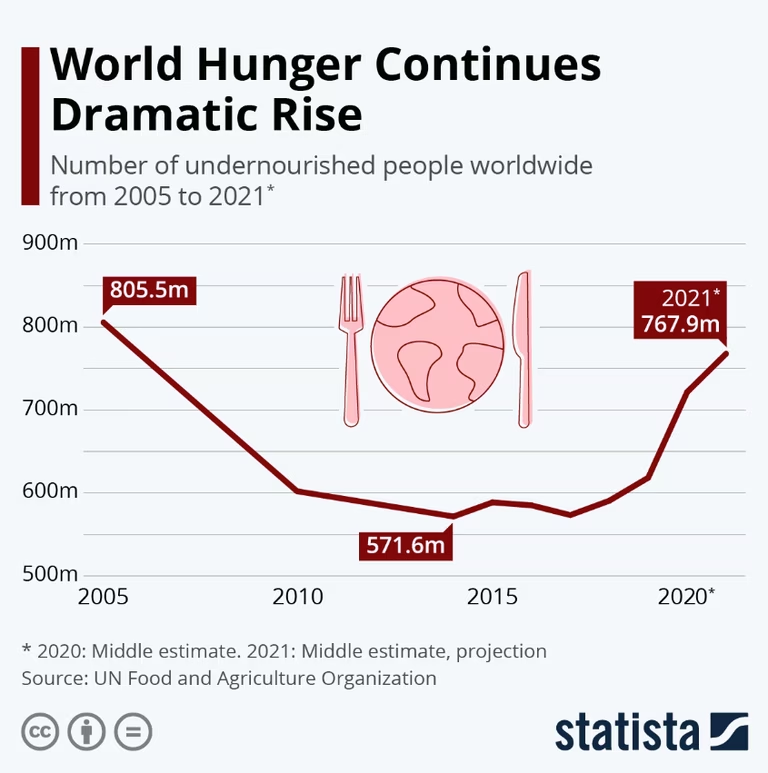
HUNGER : Food Security & Malnutrition
The global hunger crisis affects 815 million people with conflict, climate change, and poverty making the situation worse. Progress towards SDG 2 has been in reverse since 2015.
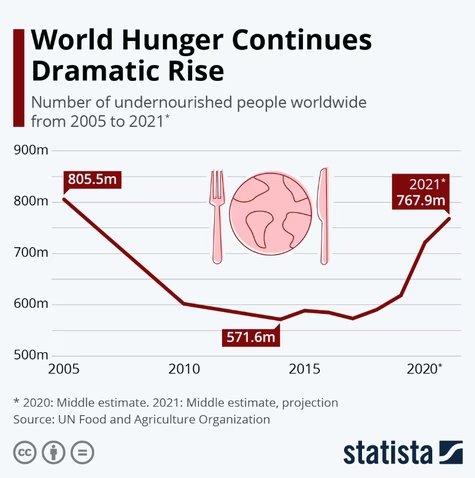
➡️ WORLD HUNGER - 318 Million People Face Crisis Levels of Hunger
We have enough food to feed everyone on the planet, yet 1 in 12 people do not have enough food to eat. This is a stark reminder of the vast inequalities in our world.
The United Nations officially define hunger as "populations who are experiencing severe food insecurity". Food security is a moral imperative. It occurs when food systems are resilient and sustainable, ensuring that people have a steady, affordable, and daily supply of enough nutritious food to meet their dietary needs.
Sustainable Development Goal 2 – Zero Hunger - aims to address the root causes of hunger, with the mission to abolish it and achieve food security for everyone. Devastatingly, conflict, climate change, and economic crises have pushed progress into reverse since 2015.
Estimates predict that approximately 670–840 million people will still face hunger in 2030. All goals related to nutrition, closing regional disparities, obesity, malnutrition, and agricultural investment and productivity are now impossible to achieve by the 2030 deadline.
"We have the tools, knowledge and resources to end hunger, and provide good, healthy food to all. What we need is unity" - António Guterres, Secretary-General of the United Nations
Jump straight to our resources on the ➡️ Hunger Crisis
Explore our comprehensive guides on -
- Organisations Working to End Hunger
- Important Study's & Publications
- Food Security
- Global Food Crisis
- Our Right to Food
- Food Deserts
- Food Sovereignty
- Food Waste
- World Food Day – October 16
- Hunger & Malnutrition in Children
- Droughts & Hunger
- Famine & Starvation in the Horn of Africa, Gaza & Sudan
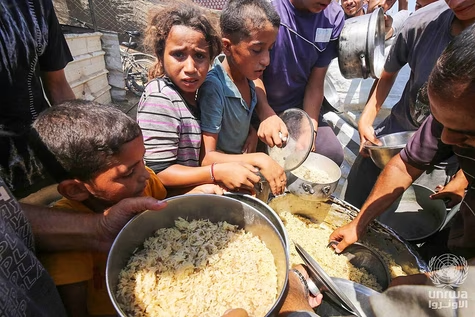
The Malnutrition Crisis
The definition of malnutrition is broad and includes undernutrition, inadequate intake of vitamins or minerals, as well as overweight and obesity.
Children are particularly vulnerable to the effects of malnutrition. In 2022, 149 million children under 5 were estimated to be stunted, 45 million were estimated to be wasted, and 37 million were overweight or living with obesity.
Undernutrition makes children in particular much more vulnerable to disease. Wasting often indicates severe weight loss due to a lack of food or an infectious disease, such as diarrhoea. Stunting is the result of chronic undernutrition and is exacerbated by poor maternal health, frequent illness, and inadequate feeding and care in early life.
Devastatingly, over 1 million child deaths every year are directly linked to severe wasting. The crisis is so bad that almost half of all deaths among children under 5 are connected to undernutrition. In the vast majority of cases, these children are from low- and middle-income countries.
"All forms of malnutrition have a common denominator – food systems that fail to provide all people with healthy, safe, affordable, and sustainable diets." - Dr Francesco Branca, director of WHO's department of nutrition for health and development.
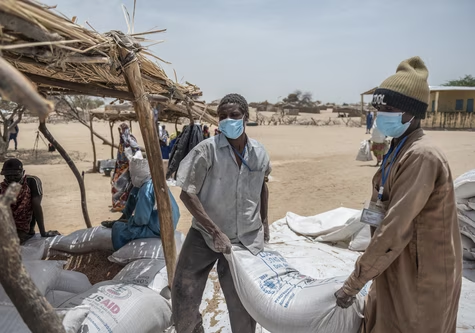
Conflict & Hunger
The World Food Programme estimates that 70% of acutely food-insecure people live in conflict-affected countries. With the world currently experiencing the highest number of armed conflicts since 1945, and with a 65% increase in conflict-affected areas since 2021, efforts to end hunger are seriously hampered.
"Conflict-driven hunger is shattering records" - António Guterres, Secretary-General of the UN
Conflict drives massive numbers of people away from their homes as their homes, lands, livelihoods, and sense of safety are destroyed. At the end of June 2025, an unprecedented 117.3 million people were forcibly displaced due to persecution, conflict, violence, or human rights abuses.
Violence destroys crops and agriculture, severely restricts access to aid, and makes access to markets impossible. Displaced people are particularly vulnerable to hunger as they leave behind their livestock, land, crops, livelihoods, and all assets. In the rare cases that food is available, inflation makes it unaffordable.
Refugee camps and host communities are overburdened and cannot cope with the influx of people. Ultimately, those who are displaced become entirely reliant on humanitarian aid. Additionally, due to a lack of sanitation, clean water and overcrowding, disease spreads quickly, exacerbating malnutrition.
We can not hope to achieve zero Hunger without peace.
Recently, we have witnessed the use of starvation as a weapon of war in Gaza. This constitutes a war crime and is closely linked to genocide. The Israeli government is deliberately denying civilians access to food, water, and humanitarian aid as a method of warfare in the Gaza strip.
In August 2025, the IPC and the United Nations officially declared the hunger crisis to be entirely man-made. The number of people in Gaza now experiencing food insecurity at an emergency level is 2.2 million.
Other conflict and hunger hotspots include Sudan, the Democratic Republic of Congo, Yemen, South Sudan, Somalia, Afghanistan, Syria, Haiti, and a large portion of the Sahel region.
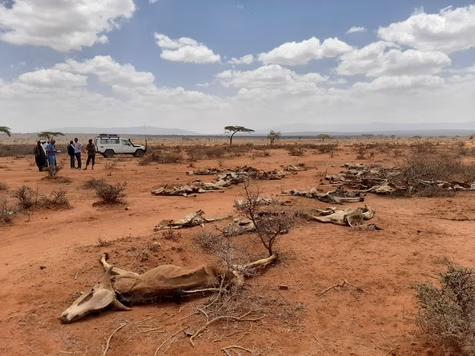
Climate Change & Hunger
Climate change is another major driver of hunger. Extreme weather events have increased fivefold over the past 50 years, and countries that were already vulnerable are bearing the brunt.
"The 10 countries with the highest UN appeals related to weather extremes since 2000 have seen a 123% rise in the number of people suffering extreme hunger -from 21.3 million to 47.5 million." - Oxfam
Hunger has more than doubled in these countries, which are struggling to cope with more frequent and more prolonged droughts, floods, cyclones, heatwaves, and wildfires. When climate disasters strike, they cause casualties, widespread displacement, wash away neighbourhoods, destroy entire harvests and livelihoods, cause poverty, and make transport links impossible. Humanitarian crises inevitably follow and are marked by hunger, disease, and desperation.
Over 1.7 billion people have been affected by climate-related disasters over the past decade. Some of the most severely affected places include Afghanistan, Burkina Faso, Guatemala, Haiti, Kenya, Madagascar, Niger, Somalia and Zimbabwe.
Climate action is not happening fast enough. Even with the strictest climate measures, it will take decades for us to limit the effects of climate change. But the widespread hunger it is causing is happening today.
Just 18 days of fossil fuel companies' profit would be enough to cover the entire UN global humanitarian appeal for 2022.
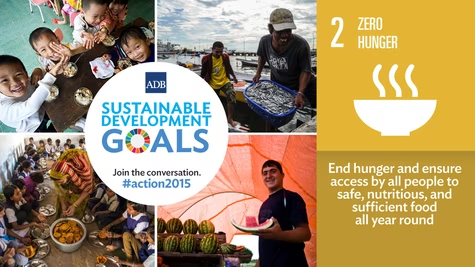
*****
The issue of hunger is complex and requires a concerted international effort. In the short term, the funding and delivery of emergency food supplies for those most in need is a priority. In the long term, we must transform our food systems to become equitable, sustainable, resilient, and affordable.
For those suffering the worst effects of climate change, we must work towards installing effective warning systems, restoring degraded ecosystems, building resilient infrastructure and investing in clean energy infrastructure.
Achieving SDG 2 requires sweeping policy reform, massive investment in agriculture, and a renewed focus on community-led initiatives. We already have the solutions and the money to end world hunger, but we cannot hope to succeed without collaboration between governments, NGOs, and the private sector.
Global peacebuilding efforts, climate action, and well-funded humanitarian assistance are key.
"The problems we face today, violent conflicts, destruction of nature, poverty, hunger and so on, are human-created problems which can be resolved through human effort, understanding and the development of a sense of brotherhood and sisterhood. We need to cultivate a universal responsibility for one another and the planet we share" - 14th Dalai Lama
Author: Rachael Mellor, 30.01.26 licensed under CC BY-SA 4.0
For further reading on Hunger see below ⬇️
Info on HUNGER : Food Security & Malnutrition
- General Info 38
- News & Blogs 19
- Organizations 103
- Publications 86
- Specific Topics 701
- Selected Articles 192